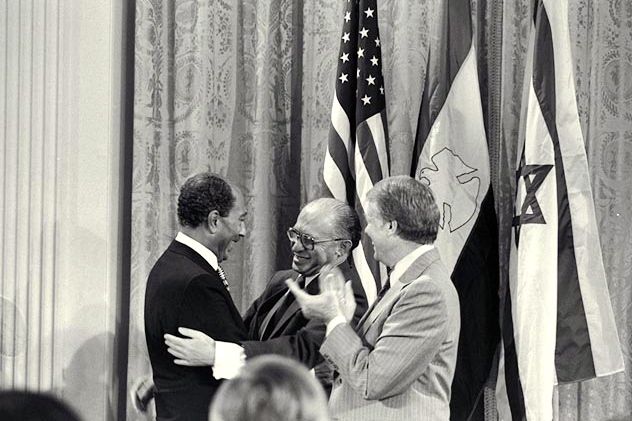The Jerusalem Post recently reported that representatives from the Jimmy Carter Foundation wore pins to support the Israeli hostages. This has sparked discussions about Carter’s legacy, given his complex and often controversial stance on Israel and Palestine. While Carter was a staunch advocate for Palestinian rights, he was also deeply committed to Israel’s security and played a pivotal role in achieving the Camp David Accords. Understanding his approach to the Israeli-Palestinian conflict requires an examination of his efforts toward peace and the ideological clashes he faced with Israeli leadership.
Carter’s Commitment to Middle East Peace
When Jimmy Carter took office in 1977, he prioritized achieving a comprehensive peace agreement in the Middle East. He believed that a stable resolution would benefit the region and enhance U.S. diplomacy. Initially, he sought to involve all parties, including Jordan, Syria, and the Palestinians. However, as Egypt and Israel preferred direct negotiations, Carter adjusted his approach to focus on brokering peace between them.
A Pivotal Meeting: Carter and Begin
Carter’s meeting with Israeli Prime Minister Menachem Begin was crucial in shaping his approach to Middle East peace. Begin, influenced by Ze’ev Jabotinsky’s militant ideology, prioritized Israel’s security above all else. His leadership in the Irgun, a paramilitary organization opposing British rule in Palestine, reflected his belief in strong military action.
Carter, in contrast, emphasized diplomacy, human rights, and Palestinian self-determination. He viewed Israeli settlement expansion as a violation of international law and a major impediment to peace. Despite ideological differences, he remained committed to finding a middle ground, recognizing that Israel’s security and Palestinian rights were intertwined.
Jabotinsky’s Legacy and Begin’s Policies
Ze’ev Jabotinsky’s belief in military strength greatly influenced Begin’s policies. Jabotinsky advocated for a strong Jewish defense force and rejected coexistence with Arab populations under a single state. His warnings about Jewish persecution proved tragically accurate with the Holocaust, reinforcing the belief in uncompromising security measures for Israel.
Begin adopted Jabotinsky’s principles, emphasizing territorial expansion and military strength as essential for Israel’s survival. This often put him at odds with Carter, who pushed for territorial compromises and Palestinian autonomy. Carter’s vision required Israel to adhere to international law, while Begin prioritized security above diplomatic concessions.

Carter’s Diplomatic Efforts and the Camp David Accords
Despite ideological clashes, Carter facilitated the Camp David Accords in 1978, a landmark peace treaty between Israel and Egypt. This agreement led to Israel withdrawing from the Sinai Peninsula and Egypt recognizing Israel—a historic diplomatic breakthrough. However, Carter’s broader vision for Palestinian self-determination was never fully realized due to resistance from Begin’s government.
Carter’s Growing Frustration with Israeli Policies
Over time, Carter became increasingly vocal about Israeli settlement expansion, viewing it as a major barrier to peace. He argued that occupation policies violated international law and undermined Palestinian dignity. His book Palestine: Peace Not Apartheid (2006) underscored his concerns, drawing criticism from pro-Israel advocates. However, Carter maintained that his critiques targeted policies, not the Israeli people, and were rooted in his commitment to human rights.
Contradiction or Evolution of Carter’s Legacy?
Jimmy Carter’s legacy in the Israeli-Palestinian conflict was centered on achieving a just and lasting peace, with a strong emphasis on Palestinian rights and international law. His frustration with Israeli policies, particularly settlement expansion, reflected his belief that peace could not be achieved without recognizing Palestinian self-determination.
The recent actions of the Jimmy Carter Foundation in supporting Israeli hostages have sparked criticism from those who believe it contradicts Carter’s legacy of advocating for Palestinian rights, suggesting a departure from Carter’s original mission. While Carter was never anti-Israel, his lifelong pursuit of peace was rooted in a commitment to justice for both Israelis and Palestinians. His approach emphasized that true and lasting peace could only be achieved through recognition of Palestinian rights alongside Israelis.
Carter sought peace through diplomacy and negotiation, the foundation’s stance raises questions about whether his legacy is being faithfully upheld. If Carter were alive and active today, he might challenge both Israeli policies and those who claim to uphold his vision without fully embracing his nuanced approach. His advocacy was rooted in the idea that security and justice must go hand in hand, and any deviation from that principle risks misrepresenting his vision for the region.





